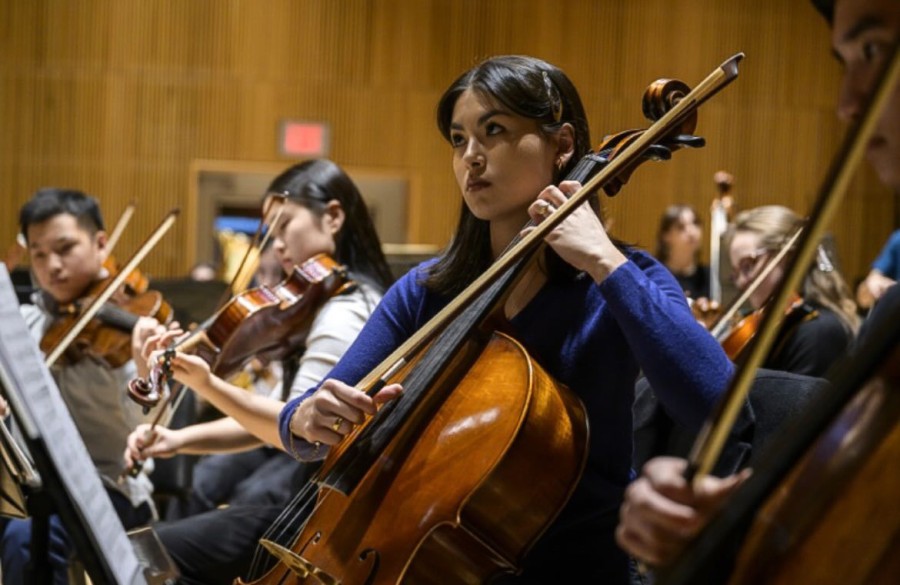Grammy-winning NYU student on uplifting Black female composers
Noelia Carrasco, a talented cellist who studies cello performance at NYU, speaks on the process of recording an album at the height of the pandemic and the importance of representation in music.
March 6, 2023
To NYU student Noelia Carrasco, winning awards is nothing new, but being part of the first youth orchestra to win a Grammy Award for Best Orchestral Performance felt different.
Carrasco was a member of the New York Youth Symphony when they recorded their award-winning album that featured works by Florence Price, Jessie Montgomery and Valerie Coleman. Carrasco recalled the thick tension that loomed over the watch party, and the excitement that followed the announcement of the group’s victory.
“At first it was complete shock, because how could that be possible?” Carrasco said. “But then, it was an enormous sense of pride that overcame me, like that really warm pit in your stomach when something amazing happens.”
The members of the New York Youth Symphony are no stranger to the hard work involved in fine-tuning their craft, but the pandemic brought on a new challenge: How does one play and record in a symphony without physically being together?
Carrasco said that on top of individual preparation, the orchestra had to grow accustomed to watching conductor Michael Repper’s movements while listening to click tracks, following metronome beats that helped them stay on beat, and playing while masked.
“During the actual recording sessions, we had to divide the strings into three groups and then there were separate groups for winds, brass and percussion. So [the string players] never even heard what the winds/brass/percussion parts sounded like until the rough draft of the recording was released.”
Growing up as a first-generation Taiwanese Bolivian raised in New Jersey, Carrasco said that her experiences being in New York City and playing with the Youth Symphony have helped shape and mold her musical creativity.
“Between New York Youth and studying at NYU, I have been a part of many collaborations in all different kinds of music — not just classical — and I find each new experience as thrilling as the next,” Carrasco said. “It only gives me excitement for how to continue expanding my musical career.”
Carrasco has played the cello since the fourth grade, and was the only one in her elementary school to do so.
“I remember the first time I played in a full orchestra with strings, winds, brass, percussion — I had never experienced such an incredible wave of sound before,” Carrasco said. “I think that’s what got me hooked.”
She now studies cello performance at NYU’s Steinhardt School of Culture, Education, and Human Development, with Marion Feldman, a leading performer and pedagogue of chamber music, and is motivated by others who also love sharing their musical gifts.
Aside from winning a Grammy, Carrasco emphasized that one of the most rewarding aspects of her musical work was being able to spotlight Black female composers.
The New York Youth Symphony played pieces that were originally composed by Black women such as Valerie Coleman, flutist, composer and Performance Today’s 2020 Classical Woman of the Year; and Jessie Montgomery, the composer and violinist whom the BBC dubbed one of the “most distinctive and communicative voices” in the United States.
The orchestra also paid homage to Florence Price, a composer from Little Rock, Arizona. During her lifetime, she became the first Black female composer to have their symphonic work performed by a major national orchestra.
Carrasco said that while it felt empowering to play these pieces, the music industry still has a long way to go in terms of representation, both in music writing and performance, and stressed that positive representation can inspire children to keep pursuing their musical passions.
“I think the interest in wanting to play music is already there for a lot of kids who are exposed to it,” Carrasco said. “But the drive to keep going ends early because of discouragement derived from stereotypes.”
For young musicians in today’s age, Carrasco recommends putting yourself out there, despite being afraid.
“[There are] always ups and downs, there’s periods of not a lot of progress but it gets better and then it will go down again but you just have to go through.”
Contact Sydni Johnson at [email protected].


























































































































































